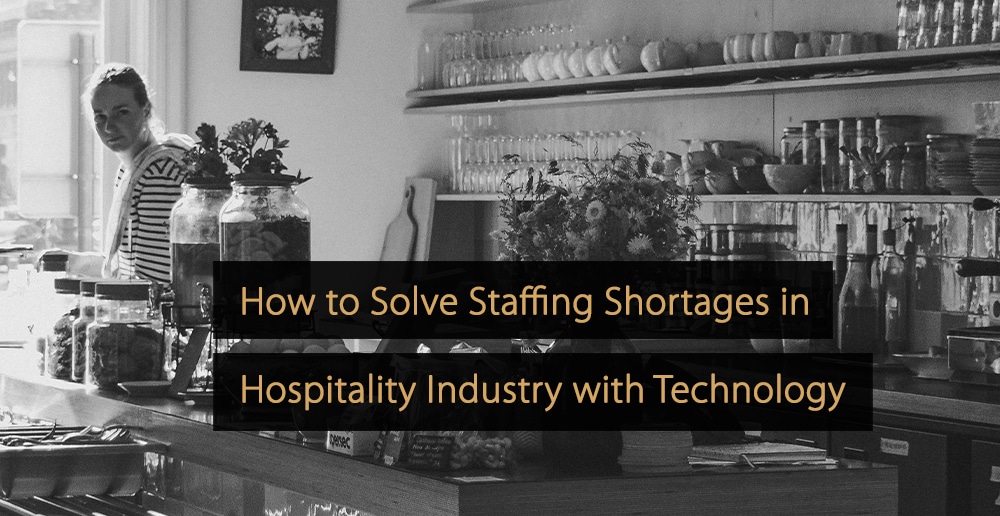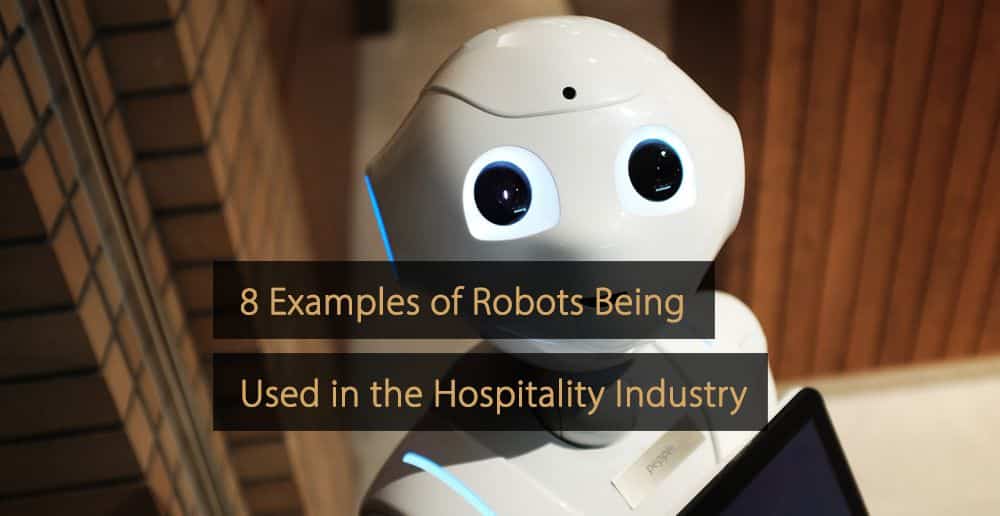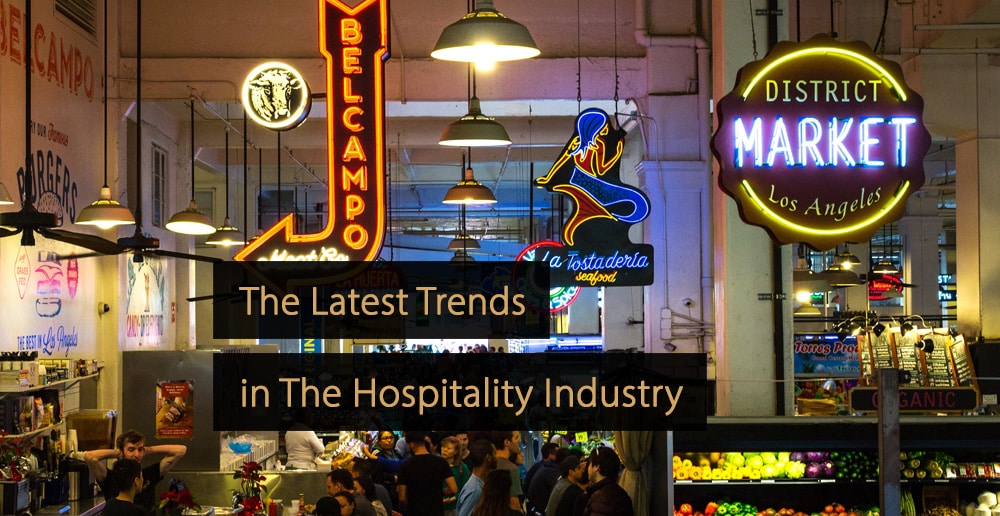Staffing shortages within the hospitality industry can hurt the quality of a business and the experience that customers or guests receive. However, the consequences of staffing issues can be greatly reduced through intelligent investment in technology. In this article, you can learn more about how technology can be deployed to solve staffing shortages or reduce the impact of lower staff numbers.
Table of Contents:
- COVID-19 and Staff Shortages in the Hospitality Industry
- Reducing & Solving Staffing Shortages in the Hospitality Industry
- Key Strategies to Employ To Reduce the Effect of Staffing Shortages
- 6 Technology Solutions That Can Help to Solve Staffing Shortages
- Tech Trends for Solving Staffing Shortages in the Hospitality Industry
- Hotel Tech to Solve Hospitality Industry Staffing Shortages
- Restaurant Tech to Solve Staffing Shortages in the Hospitality Industry
COVID-19 and Staff Shortages in the Hospitality Industry
Staffing shortages in the hospitality industry can present a major challenge, and this has become a reality for many businesses in the wake of the COVID-19 pandemic. In particular, two years’ worth of work disruption and uncertainty in the hotel industry and restaurants and bars has led many working in the industry to explore other options.
As the world has gradually returned to normality, and as customers are coming back to hotels, restaurants, bars, and similar properties, many of these businesses face the very real challenge of living up to high customer expectations and delivering an excellent customer experience, all while operating with a reduced workforce.
This issue has also been worsened because the virus is still spreading, meaning employees who catch it are likely to need to take time off work to recover and avoid spreading it to customers, guests, and colleagues.
Reducing & Solving Staffing Shortages in the Hospitality Industry
In the aftermath of the COVID-19 crisis, many businesses feel the full force of staffing shortages in the hospitality industry. They have to cope with a reduced workforce and a world where employees in other industries can increase their job satisfaction by working from home. Hotel technology will play a key role in helping to reduce staffing shortages within hospitality businesses, and it will also help companies reduce the impact of those staffing shortages.
Investment in technology that can improve the experience of employees is a major consideration for hotels, resorts, restaurants, bars, cafes, and other similar businesses. This technology can range from payroll software, that can accurately track hours of work and compensate staff properly, to in-work systems, which can allow customers to take advantage of more self-service options, reducing staff workloads and increasing satisfaction.
Meanwhile, intelligent investment in technology can also help to improve the customer experience in light of fewer staff being available to cater to their needs. For example, mobile check-in technology solutions can make it easier to check in to hotels without requiring individual support from the reception desk, while self-ordering options within restaurants can allow customers to place their order in their own time, without waiting for staff.
Key Strategies to Employ To Reduce the Effect of Staffing Shortages
There are several strategies that those in the hotel and restaurant industry, along with similar fields, can utilize to minimize the effects of staffing shortages in hospitality.
Manage Guest Expectations
The COVID-19 pandemic contributed to ongoing staffing shortages in the hospitality industry. Still, the issues facing those in restaurant, bar, cafe, and hotel management positions became tougher because customer expectations increased simultaneously. This is especially apparent with things like hygiene and safety measures.
For this reason, it is important to manage guest expectations in advance using social media and your website. For those in the restaurant industry, this could mean explaining that menus are more limited, or that self-service options are in place. Meanwhile, hotels must take the time to explain any services or facilities that are not available.
Show Appreciation to Your Current Employees
While the staffing shortages that have hit the hospitality industry can be frustrating, managers and senior figures mustn’t lose sight of the importance of the employees they still have. Efforts should be made to show staff appreciation and offer them incentives to continue their careers.
For instance, it may be possible to offer development opportunities. Not only can this help to make employees feel more valued within the workplace, it can also help to up-skill employees, allowing them to compensate for staff shortages more effectively. It is also important to seek feedback from workers and strive to improve their experience.
Automate When Possible
Another major strategy to cope with any staffing shortages in the hospitality industry is to try to automate as many tasks as possible. In particular, repetitive or predictable activities can often be handled automatically as long as you take the time to invest in the right technology and keep pace with technology trends.
Examples of some of the tasks that can be automated include booking confirmations, the sending of pre-arrival information emails, and check-ins or arrivals. Robotics means that certain cleaning activities can be handled without human intervention, while AI chatbots can respond to the most basic customer questions.
6 Technology Solutions That Can Help to Solve Staffing Shortages
Aside from adopting the aforementioned strategies for assisting with staffing shortages in the hospitality industry, it is also worth exploring some restaurant, bar, and hotel technology that can help.
1. QR Codes
Intelligent use of QR codes within a business can go a long way towards alleviating employee pressure and reducing the overall impact of staffing shortages in the hospitality industry. For instance, in the restaurant industry, QR codes can be placed on menus to link customers to an online self-service ordering system.
Meanwhile, QR codes can be used within hotels to link customers to room service ordering systems, direct guests to a mobile app, or check in and out of the property. QR codes for tools like mobile apps can also be included in hotel marketing materials so that guests arrive for their stay with the app already installed.
2. Contactless Check-In for Hotels
Contactless check-ins are one of the major ways those in the hotel industry can reduce the burden on reception staff, while also improving the guest experience. The process typically involves using a mobile app, meaning guests can check in without contacting reception staff.
Once a guest checks in, the hotel is automatically informed of their arrival, and this can then alert concierge staff and others involved with greeting guests. This process means that staff can get on with other tasks and opens up the possibility of 24/7 check-ins, even if the reception desk is not staffed.
3. Restaurant eCommerce
Online ordering is one of the most significant hospitality trends to emerge after the pandemic, with many businesses reducing the burden on staff by offering eCommerce options. This could mean providing an online ordering system on the company website within the restaurant industry. This system can be used by customers to place takeaway orders, or to book a visit to the restaurant while pre-ordering their meals.
Where such options are available, customers can pay in advance, or provide details so payment can be automatically taken after their visit, and the restaurant can have advanced notice of what food needs to be prepared. Takeaway services are also one of the most significant restaurant trends, allowing restaurants to continue generating income even during the pandemic’s peak when in-person visits were prohibited.
4. Event Planning Software
One of the biggest challenges threatening hotels and similar businesses facing staffing shortages is event planning. This discipline can be especially time-consuming because individual events all have their own requirements, and rooms need to be set up for each event. However, event planning software can reduce the workload.
Some of the best event planning software solutions will allow you to quickly and easily create seating plans, provide venue information to clients, and take orders for food, beverages, and more. Many will even provide automated arrival tools, allowing event attendees to arrive and get seated independently, or with minimal assistance.
5. AI Chatbots
Artificial intelligence powers many technology solutions, usually to automate processes and provide faster analysis or data. One area showing particular promise for those experiencing staffing shortages in the hospitality industry is using AI chatbots.
Chatbots are an AI-driven technology that can hold online chat-based conversations with human customers. Chatbots are especially valuable for customer service, where they can screen customer questions, provide solutions for the most basic issues, and gather other useful information for customer service agents.
6. Hotel Robots
Finally, staffing shortages within the hospitality industry can be further aided through robotics. Robotics is one of the fastest-growing hotel trends because automated front desk and housekeeping services can help properties cope with rising customer hygiene and cleanliness demands, even when struggling with a reduced workforce.
Robots can potentially be used to greet guests, offer basic tourist information, provide directions, and offer suggestions or recommendations. Robotic vacuum cleaners can automate part of the cleaning process, and this can be especially beneficial in larger properties, where such tasks can take human staff many hours to complete.
Video: Japanese hotel boasts a robotic staff
Tech Trends for Solving Staffing Shortages in the Hospitality Industry
An awareness of the latest technology trends can go a long way for anyone dealing with staffing shortages in the hospitality industry. After all, technology can automate common tasks, allow customers to capitalize on self-service options, and enjoy a more seamless experience, less reliant on contact with staff.
Read “The Latest Technology Trends in the Hospitality Industry” for a breakdown of the most significant trends in this area, including contactless payments, voice control, robotics, recognition technology, and chatbots.
Hotel Tech to Solve Hospitality Industry Staffing Shortages
Hotels have been especially hit by the staffing shortages affecting the hospitality industry, but several specific hotel technology trends are emerging, which have the potential to help. These include facial recognition technology, the rise of smart hotels, hotel apps, and more.
Check out “Hotel Technology Trends: 16 Upcoming Innovations You Must Know” to learn more about the hotel tech solutions that are playing an ever-growing role in the industry and will continue to do so in the years ahead.
Restaurant Tech to Solve Staffing Shortages in the Hospitality Industry
The restaurant industry faces its own unique challenges, given the staffing shortages hitting the hospitality industry. Fortunately, many of these challenges can be resolved, or their impact can be reduced through investment in relevant restaurant technology. Of course, this does require an awareness of the latest trends.
Read “Latest Restaurant Technology Trends You Need to Know About” for more on digital kitchen displays, cloud-based point-of-sale systems, QR codes, contactless payments, and other technology disrupting the industry.
Staffing shortages have affected many businesses in the hospitality industry, with the COVID-19 pandemic contributing significantly to the problem. However, with the right strategies and investment in relevant technology, the impact of these shortages can be greatly minimised, ensuring customers remain happy.
More Tips to Grow Your Business
Revfine.com is the leading knowledge platform for the hospitality and travel industry. Professionals use our insights, strategies, and actionable tips to get inspired, optimize revenue, innovate processes, and improve customer experience.Explore expert advice on management, marketing, revenue management, operations, software, and technology in our dedicated Hotel, Hospitality, and Travel & Tourism categories.
This article is written by:
Hi, I am Martijn Barten, founder of Revfine.com. With 20 years of experience in the hospitality industry, I specialize in optimizing revenue by combining revenue management with marketing strategies. I have successfully developed, implemented, and managed revenue management and marketing strategies for individual properties and multi-property portfolios.









Leave A Comment